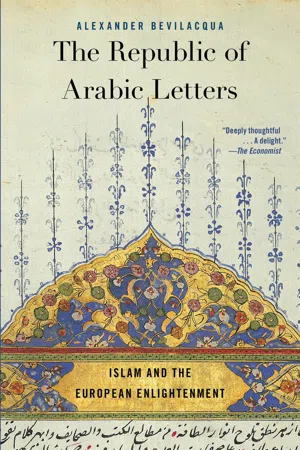
- English
- PDF
- Available on iOS & Android
About This Book
Winner of the Herbert Baxter Adams Prize
A Longman– History Today Book Prize Finalist
A Sheik Zayed Book Award Finalist
Winner of the Thomas J. Wilson Memorial Prize
A Times Literary Supplement Book of the Year "Deeply thoughtful…A delight."— The Economist "[A] tour de force…Bevilacqua's extraordinary book provides the first true glimpse into this story…He, like the tradition he describes, is a rarity."
— New Republic In the seventeenth and eighteenth centuries, a pioneering community of Western scholars laid the groundwork for the modern understanding of Islamic civilization. They produced the first accurate translation of the Qur'an, mapped Islamic arts and sciences, and wrote Muslim history using Arabic sources. The Republic of Arabic Letters is the first account of this riveting lost period of cultural exchange, revealing the profound influence of Catholic and Protestant intellectuals on the Enlightenment understanding of Islam."A closely researched and engrossing study of…those scholars who, having learned Arabic, used their mastery of that difficult language to interpret the Quran, study the career of Muhammad…and introduce Europeans to the masterpieces of Arabic literature."
—Robert Irwin, Wall Street Journal "Fascinating, eloquent, and learned, The Republic of Arabic Letters reveals a world later lost, in which European scholars studied Islam with a sense of affinity and respect…A powerful reminder of the ability of scholarship to transcend cultural divides, and the capacity of human minds to accept differences without denouncing them."
—Maya Jasanoff"What makes his study so groundbreaking, and such a joy to read, is the connection he makes between intellectual history and the material history of books."
— Financial Times
Frequently asked questions
Information
Table of contents
- Cover
- Title Page
- Copyright
- Epigraphs
- Contents
- Note on Terminology, Names, Transliteration, and Dates
- List of Protagonists
- List of Frequently Discussed Arabic and Islamic Authors
- Introduction
- 1. The Oriental Library
- 2. The Qur’an in Translation
- 3. A New View of Islam
- 4. D’Herbelot’s Oriental Garden
- 5. Islam in History
- 6. Islam and the Enlightenment
- Epilogue
- Abbreviations
- Notes
- Selected Bibliography
- Acknowledgments
- Index
- Color Plates